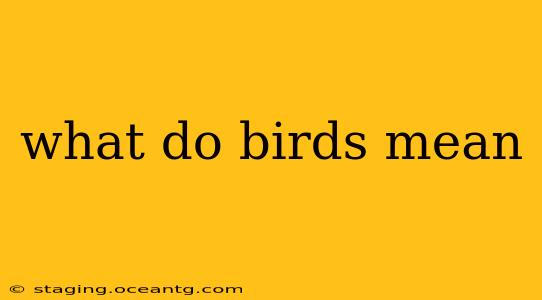Birds have captivated human imagination for millennia, their flight a potent symbol of freedom, their songs a melodic expression of the natural world. But what do birds mean? The answer, much like the avian world itself, is complex and multifaceted, varying across cultures, time periods, and individual experiences. This exploration delves into the rich symbolism and cultural significance surrounding these feathered creatures.
What are the common symbolic meanings of birds?
The symbolic meaning of birds often depends on the specific species, its behaviors, and the cultural context. However, some common themes emerge:
-
Freedom and Liberation: The ability to soar effortlessly through the sky makes birds potent symbols of freedom and liberation from earthly constraints. This is a universally understood association, transcending cultural boundaries.
-
Spirituality and the Soul: In many cultures, birds are seen as messengers between the earthly and spiritual realms, carrying souls to the afterlife or acting as intermediaries between humans and the divine. Think of the dove in Christianity, representing the Holy Spirit.
-
Hope and Renewal: The migratory patterns of birds, their return after winter, frequently symbolize hope, rebirth, and the cyclical nature of life. The arrival of spring often brings with it the songs of birds, reinforcing this association.
-
Change and Transformation: The metamorphosis from fledgling to mature bird, the process of molting, and the ability to migrate vast distances, all contribute to the bird's association with change and transformation.
-
Knowledge and Wisdom: Certain birds, like owls, are associated with wisdom and knowledge due to their nocturnal habits and perceived intelligence. Other birds, through their keen observation skills, also embody these qualities.
What different cultures think about birds
Different cultures ascribe unique meanings to birds, often rooted in their mythology, folklore, and historical experiences. For example:
-
Native American Cultures: Many Native American tribes hold specific birds sacred, associating them with particular clans or totems. The eagle, often representing power and strength, is a prominent example. Specific bird calls and migrations were also often interpreted as omens or messages.
-
Celtic Cultures: In Celtic mythology, birds frequently represent the Otherworld and possess powerful magical attributes. Certain birds were associated with specific deities or had significant roles in mythological tales.
-
East Asian Cultures: In many East Asian cultures, the crane symbolizes longevity and good fortune, while the phoenix signifies rebirth and immortality.
What do different bird species symbolize?
The symbolism associated with specific bird species is also vast and varied. Some examples:
- Dove: Peace, love, purity, the Holy Spirit.
- Eagle: Power, freedom, strength, vision.
- Owl: Wisdom, knowledge, mystery, magic.
- Raven: Intelligence, mystery, magic, trickery.
- Swan: Grace, beauty, elegance, transformation.
- Peacock: Pride, beauty, royalty, immortality.
How can I interpret the meaning of a bird I've seen?
Interpreting the meaning of a bird you've seen is a highly personal process, influenced by your own experiences and beliefs. Consider:
- The species of the bird: Research the symbolic associations traditionally linked to that particular bird.
- The bird's behavior: Was it singing, flying high, or behaving unusually? This can offer further clues.
- Your personal feelings: What emotions did seeing the bird evoke in you? This is often a powerful guide.
- Your current circumstances: Reflect on your life and what might be happening that could connect to the bird's symbolism.
What does seeing a specific bird repeatedly mean?
Repeated sightings of a particular bird can be seen as a significant message or omen. Consider the bird's symbolism and how it relates to your current life situation. It could be a reminder, a warning, or an encouragement. Keep a journal to track your observations and reflect on any potential connections.
This exploration only scratches the surface of the rich and diverse meanings associated with birds. The next time you observe a bird, take a moment to appreciate its beauty and consider the potential meaning it holds for you. Further research into specific avian species and cultural contexts will enhance your understanding of this captivating subject.
